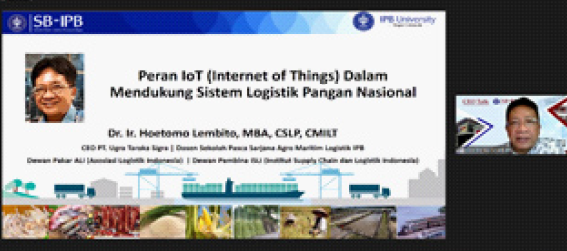
The Role of IoT (Internet of Things) in Supporting the National Food Logistics System
Kapita Selecta Management and Business (KSMB) Class R63 & R64 on October 13, 2020, Mr. Hoetomo Lembito wishes to share about the role of IoT (Internet of Thing) in Supporting the National Food Logistics System. He is the CEO of PT Ugra Takara Sigra, the Board of Experts of ALI (Indonesian Logistics Association), the Board of Trustees of ISLI (Indonesian Institute of Supply Chain and Logistics), and a Lecturer at the Postgraduate School of Agro Maritime Logistics IPB University. He completed S1 from IPB, S2 from PSBA (Philippine School Business Administration), and S3 from SB-IPB University.
The national food system is built with the spirit/foundation of food sovereignty and self-sufficiency, performance measures seen from national food security in which there is food security, the outcome is that individuals and communities can live healthy, active, and productive lives sustainably. The impact of Covid-19 on national resilience is the disruption of agricultural production due to restrictions on the movement of people/labor, a decrease in people’s purchasing power of demand for agricultural products, disruption of food distribution due to the implementation of PSBB, and limited area closure, farmers vulnerable to Covid-19, the potential food crisis, and threats to the availability of national food stocks originating from imports such as wheat, sugar, beef, garlic, and soybeans. The policies and programs of the Ministry of Agriculture are to increase the productivity of staple foods, facilitate food distribution, facilitate access to transportation, maintain price stability, and develop and intervene in markets.
The target is an increase in farmer exchange rates.
The national logistics system has been built based on supply chain management, the paradigm of “ship follows the trade and ship promote the trade” and uses an approach of six key logistic drivers (six key drivers). The six key drivers of logistics are commodities, infrastructure, actors and service providers, human resources, ICT, and regulations. The national logistics network is built with the integration of local and national networks as well as global network connections.
Information technology and digitalization have entered all aspects of life. The focus of the logistics strategy with IoT is last-mile distribution (responsiveness), strengthening the flow of goods from rural areas, between islands and IKM clusters (efficiency), as well as modes of transportation and warehousing (responsiveness and efficiency). The conventional food and agro logistics system is required to become a high-precision food and agro logistics system (smart, adaptive, and resilient) by utilizing ever-evolving information technology. So, the food supply chain will be transformed with Blockchain and IoT






Recent Comments